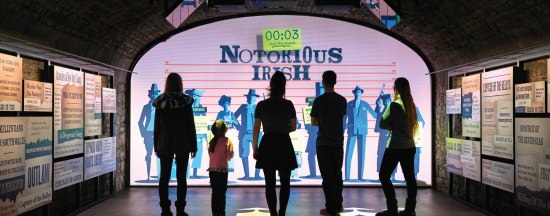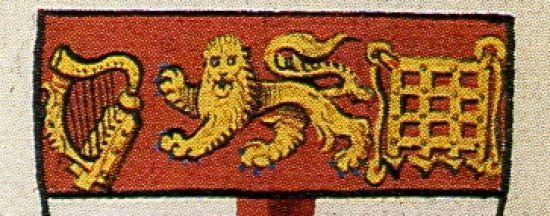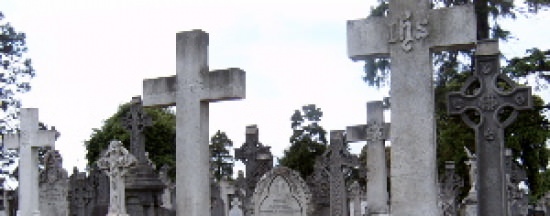There is a wide range of resources available in Dublin for people who wish to trace their ancestry. From census records and marriage certificates to land deeds and church records, not to mention many helpful genealogy specialists, Dublin is a key place to begin your family research for anywhere in the country.
Here is a brief overview of Irish genealogical resources (information largely taken from the Fáilte Ireland “Dublin Pocket Guide”):
Official Irish Genealogy Website
www.irishgenealogy.ie
This website is operated by the Department of Arts, Heritage and the Gaeltacht, and allows users to search a wide range of record sources. The website is home to the on-line Indexes of the Civil Registers (GRO) of Births, Marriages, Civil Partnerships and Deaths; and to Church Records of Baptism, Marriage and Burial from a number of counties.
On the church records front, you can search all pre-20th century Roman Catholic and Church of Ireland baptism, marriage and burial registers for Dublin City; and you can do similar searches for a small number of additional counties.
The site also operates as a search portal that allows users to search the following record sources:
- 1901/1911 Census records and pre-1901 survivals
- Census Search Forms from 1841/1851
- Tithe Applotments
- Soldier’s Wills
- Griffith’s Valuations
- Ireland – Australia Transportation database
- Military Archives
- Ellis Island
- National Photographic Archive from the National Library of Ireland
National Archives, Bishop Street, Dublin 8.
Phone 01 407 2300
www.nationalarchives.ie
The National Archives hold many records that are relevant to Irish genealogy and local history, including the surviving census records. Members of the public are welcome to visit and explore the sources available, and can avail of an in-house Genealogy Service, which offers a free, short personal consultation with a professional genealogist. The complete 1901 and 1911 census records are also available online on the National Archives website.
National Library of Ireland, Kildare Street, Dublin 2.
Phone 01 603 0200
www.nli.ie
The National Library offers a free Genealogical Advisory Service, making it the perfect place to start your research. The Genealogist on duty will provide you with an overview of Irish genealogical records and explain how to locate search tools and how to access the records. Resources available include civil records, microfilm of Catholic Church records, and land and property records.
A new online resource for researching family history from the 18th and 19th centuries was launched in July 2015 – the National Library’s parish records website. This site contains digitised details of births, deaths and marriages in most Catholic parishes during the 1700s and 1800s. The details available on the website provide an invaluable stepping stone for anyone trying to complete a family tree, given that all pre-1901 census records were destroyed during the Four Courts fire of 1922. To get the most from searching the site, please find out (if you can) the exact parish where your family member was born, as well as the year of birth.
General Register Office, Werburgh Street, Dublin 2.
Phone 090 663 2900
https://www.gov.ie/en/campaigns/af7893-general-register-office
The General Register Office holds all civil birth, marriage and death records from 1864 onwards (records for the six counties of Northern Ireland are only held as far as 1921). All of the Office’s records are now searchable online – see the entry below for www.irishgenealogy.ie for more details.
Dublin Cemeteries Trust, Glasnevin Cemetery, Finglas Road, Dublin 11.
Phone 01 882 6500.
dctrust.ie
The Dublin Cemeteries Trust has about 1.5 million records available for Glasnevin, Dardistown, Newlands Cross, Palmerstown and Goldenbridge cemeteries, as well as Glasnevin and Newlands Cross crematoria.
Registry of Deeds, Henrietta Street, Dublin 1.
Phone 051 303 000
https://www.tailte.ie/
The Registry of Deeds was established in 1708 to regulate land and proprty transactions. Registration of deeds was not obligatory and was mainly carried out by property-owning classes such as landowners, merchants and traders.
Dublin City Library & Archives, 138-144 Pearse Street, Dublin 2.
Phone 01 222 4999
https://www.dublincity.ie/residential/libraries
The Dublin City Library provides several archive collections, including historical maps of Dublin, Dublin City Council records, local parish records and online access to historic electoral rolls and electoral lists, and a directory of Dublin graveyards.
Valuation Office, Block 2, Irish Life Centre, Lower Abbey Street, Dublin 1.
Phone 01 817 1000 or 1800 304 444
https://www.tailte.ie/valuation/archive-research/genealogy
The Valuation Office houses maps and cancelled and current land books which are based on Griffith’s Primary Valuation. The cancelled and current land books document all changes of occupancy of land and property from the time of the original survey (1848-1864) to the late 20th century.
Representative Church Body Library, Braemor Park, Dublin 14.
Phone 01 492 3979
www.library.ireland.anglican.org
The Representative Church Body Library is the principal repository of archives and manuscripts of the Church of Ireland (Anglican Church). It holds the registers of over 600 parishes from counties now in the Republic of Ireland, as well as microfilm copies of many others.
Religious Society of Friends Library, Stocking Lane, Rathfarnham, Dublin 16.
Phone 01 499 8003
www.quakers-in-ireland.ie
The Society of Friends (Quakers) has been keeping records since the 17th century. Of particular interest are the transcribed registers of births, marriages and deaths held at this library.
The Irish Jewish Genealogical Society, Jasonia Centre, 76 Dame Street, Dublin 2.
Phone 00 44 788 979 4757
www.irishjewishroots.com
Individual entries cover over 105 fields of information such as date and place of birth, school, marriage and occupation details where available, as well as links to parents, children and siblings.
Accredited Genealogists Ireland (formerly Association of Professional Genealogists in Ireland)
www.accreditedgenealogists.ie
You can find additional helpful information in the guide, “Tracing your Ancestors in Ireland”, which you can download from www.familyhistory.ie


